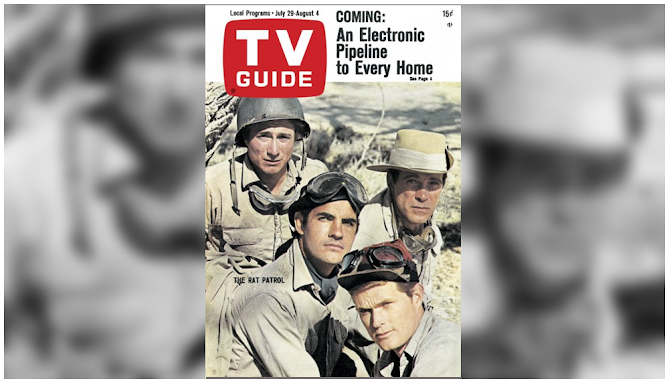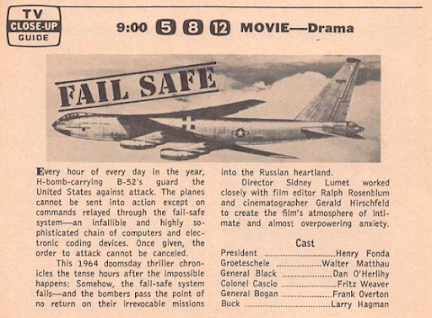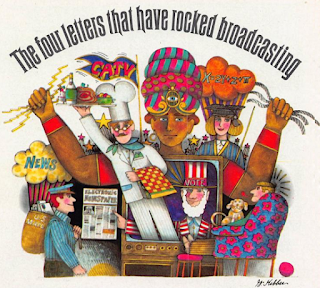The nation still reels from the assassination of Robert F. Kennedy a little over two weeks ago, and television is no exception.
Periodically throughout its history, the medium's majordomos have engaged in bouts of soul-searching, and as television increases in cultural importance, it displays something of a schizophrenic attitude regarding its responsibility to society. In the aftermath of the assassinations of Kennedy and Martin Luther King, as well as increasing urban turmoil, all eyes turn toward the effect that TV might have had on creating a "climate of violence."
This week, Richard K. Doan asks the question: "Had television's violence-prone "action-adventure" drama contributed substantially to today's climate of solution-by-murder?" People from all walks debate the issue, from historian (and Kennedy camp follower) Arthur Schlessinger to playwright Arthur Miller to the president of the United States himself, who asks "whether 'the seeds of violence' have been nurtured by TV, movies and news media." The Louisville
Times refers to "America the Brutal," and points the finger at TV as "a root" of the evil, using a picture of Richard Boone as Paladin in
Have Gun—
Will Travel as evidence. (I know it's hard to believe, considering what one sees on TV nowadays, but at one time
Have Gun—
Will Travel was considered one of the most violent programs on television
.
New York Representative John Murphy condemns the networks, saying that "[n]ight after night one program after the other shows violence in great detail and in living color." Miller, the playwright, says that the country was now at the stage where "any half-educated man in a good suit can make his fortune by concocting a television show whose brutality is photographed in sufficiently monstrous detail."
It's not just politicians and pundits raising Cain, though, as a perusal of the Letters to the Editor section shows. Casey Willis of Tucson complains that although there have been hundreds of gun killings in the U.S., "many of the most popular shows on TV have been based on firearms and violence," and suggests that TV "should search its own soul." Mary Hendrickson of Hudson, NY adds that "I can censor my own children's programs, but what of the children whose parents don't know or care what is pounded into their impressionable little heads?" TV has done a good job covering the recent tragedies; now, "do something to
prevent them." And P. Corcoran of the Bronx says that "TV is one of the worst offenders in this crime" of violence flooding the country, citing
Mission: Impossible as one of the shows "warping our youngsters."
Of course, there's one problem with these theories: the possibility, if not probability, that Kennedy's assassination was a political act. We're not here to debate the identities of the individuals or organizations behind the assassination, but we are talking about the television's culpability in the murder, and so it bears pointing out that if Sirhan Sirhan, who was convicted of Kennedy's murder, was indeed guilty, then one also has to accept that his motive was not the violent content on TV, but a hatred of Kennedy for his support of Israel, and that the act itself was planned in a cold, calculating manner. If, on the other hand, the assassination was part of a conspiracy (whether or not it included Sirhan), then you have to conclude that the killing was a geopolitical act, involving the FBI, the CIA, the military, the LAPD, or any one of countless organizations, and requiring a fairly high level of coordination. In either case, this leaves no room for televised violence as a cause. Political zealots probably don't have time to watch television let alone be influenced by it, and it's highly unlikely that the conspirators at the FBI got the idea from watching Seven Days in May on Saturday Night at the Movies. It probably would have happened even if the most violent thing on television was a fluffy white kitten attacking a ball of yarn.
Be that as it may—and, as we all know, there's no room for logic when emotion is involved—the ensuing hue and cry virtually demands a response from network executives, and one shape this takes is by pulling its most violent episodes off the air, at least for the short term. NBC also released a statement assuring the public that they "have established policies and procedures to guard against the depiction of violence fore its own sake," while CBS president Frank Stanton promised that the network "would seek to 'de-emphasize' violence" on their programs.
One testimony to the effect of the assassination on television is the slew of shows bearing the legend "Postponed from an earlier date," the heaviest concentration of which appear on Saturday. Although network coverage of the assassination and aftermath were nowhere near the 1963 levels, all three networks preempted virtually all of their Saturday programming for Kennedy's funeral and burial. The intent had been to return to regular programming at the start of prime time, but the funeral train was four-and-a-half hours late, and the entire slate wound up being wiped out.
The Prisoner, Hogan's Heroes, The Dating Game, Petticoat Junction, an ABC profile of land speed-record holder Craig Breedlove—all were victims of the accordion effect of postponements and rescheduling. (The Breedlove documentary finally airs this Saturday at 4:00 p.m. PT on ABC.)
And so the landscape changes, for a time, and kinder, gentler programming will now be the fashion, with programs such as The Wild Wild West no longer on network schedules. But for how long? (As Doan points out, four days later NBC's action series The Champions featured a scene in which one of the show's heroes "was tortured by being stretched on an automobile version of the medieval rack.) I suppose there's any number of studies that could isolate when the trend toward more violent fare resumed, and let's face it: no matter how noble the intent might be, ultimately ratings (and the concurrent advertising dollars) rule, and the viewers cast the deciding votes. The level of violence on television today is astonishing; I can't imagine what the people, who were so aghast at '60s violence, would think of it. One could argue that, having grown up in a so-called culture of violence, people are more inured to it, making them less likely to be influenced by it. And yet, things seldom change much: every time there's a school shooting or bombing or other act of violence, the cry arises once again. If it's not television, it's video games; if not that, then something else.
For a long time, television has attempted to have it both ways, downplaying the influence its programs have on viewers' behavior while at the same time accepting ads designed to influence viewers' behavior. That's always seemed a bit disingenuous to me.
Of course the content of television programming affects viewers. Likewise, though, there can't be much doubt that the audience is receptive and willing. It's a chicken-and-egg situation: does the problem lie with the programming, or the people watching it?
l l l
 During the 60s, the
During the 60s, the Ed Sullivan Show
and The Hollywood
Palace
were the premiere variety shows on television. Whenever they appear
in TV Guide together, we'll match them up and see who has the best
lineup..
Sullivan: On this first in a series of reruns, CBS renames its Broadway theater in honor of Ed. Guests: New York City mayor John Lindsay, Pearl Bailey, Alan King, Met baritone Robert Merrill, actress-dancer Gwen Verdon, comedians Wayne and Schuster, the Argentine singing group Los Nimos Cantores de Murialdo, and the Emerald Society pipe bands of New York's police and fire departments.
Palace: Host Sid Caesar dominates this hour of comedy and music. Guests: Marlo Thomas (who narrates a showing of 1968 resort fashions), singers Sergio Franchi and Fran Jeffries, and the rocking Checkmates, Ltd. In a mime spot, Sid conducts Tchaikovsky’s "1812 overture." Sketch: The hiring of a too-attractive maid brews trouble for three neighboring couples.
I suppose that we should be impressed by New York Mayor John Lindsay's appearance at the dedication of the Ed Sullivan Theater; CBS could just as well have had William Paley make the presentation instead. (Of course, Lindsay was the flavor of the month back then.) It's a bug, not a feature; even so, no matter how good Sid Caesar might be, Marlo Thomas and the Checkmates are not going to edge out Pearl Bailey, Alan King and Robert Merrill. Never mind the politicians:
this week, my vote goes to Sullivan.
l l l
The summer months mean not only reruns, but summer replacement series. We'll start, however, with
Kup's Show (
Saturday, 9:00 p.m., KEMO in San Francisco), hosted by the legendary
Chicago Sun-Times columnist Irv Kupcinet. At three hours, it's the longest talk show on television (not including David Susskind's
Open End, which could last who-knows-how-long), but it's often worth it. Tonight's guests are indeed an eclectic collection: Alf Landon, former governor of Kansas and the unsuccessful 1936 Republican presidential candidate (they wouldn't win until 1952); Charlie Grimm, former manager of the Chicago Cubs, who managed them to the World Series in 1945 (they wouldn't be back for another 71 years); and Arlene Francis, who doesn't seem to fit any of these categories but is a delightful presence nonetheless.
CBS must be breathing a sigh of relief; the Smothers Brothers are on vacation for the summer, and in their place is
The Glen Campbell Goodtime Hour (
Sunday, 9:00 p.m.). Glen's special guest tonight is Nancy Sinatra, and they'll be joined by Smothers regulars Pat Paulsen and Leigh French. Campbell, riding a string of hits (with more on the way), is everything that a network could hope for from a variety show host
, and he'll do well enough in the ratings to merit a return engagement the following January, where he remains until January 1972.
Monday night sees the debut of
Comedy Playhouse (9:00 p.m., NBC), a collection of comedy episodes that originally appeared on
Bob Hope Presents the Chrysler Theater back in 1966. Monty Hall is the host this time around, and we start things off with "And Baby Makes Five," a frothy story about the differences between city and country life, with a cast that makes up for the plot: Cliff Robertson, Angie Dickinson, Nina Foch, and Walter Abel.
Tuesday's a night for summer variety shows, beginning with Showcase '68 (8:00 p.m., NBC), hosted by Lloyd Thaxton, which serves as the replacement for The Jerry Lewis Show. The show highlights young entertainers performing for a group of guest judges; tonight's show comes from the World's Fair in San Antonio, Texas, with Bobby Vinton as the special guest. A more conventional variety show is the similarly-named Showtime (8:30 p.m., CBS), the summer stand-in for The Red Skelton Hour, this week with Eddy Arnold as host. Showtime is one of a number of British imports produced by Lew Grade's ITC Entertainment, a mainstay of 60s TV; other shows of theirs finding spots in the American summer schedule include the terrific Man in a Suitcase (Friday, 8:30 p.m., ABC), in place of its Disney-wannabee Off to See the Wizard; the aforementioned The Champions (Monday, 8:00 p.m., NBC), subbing for Laugh-In; and The Prisoner (Saturday, 7:30 p.m., CBS), filling in for The Jackie Gleason Show.
Wednesday's highlight comes in the late-night hours, with the 1950 noir classic D.O.A. (12:15 a.m., KBHK in San Francisco), starring Edmund O'Brien as a poisoned man trying to solve his own murder before he dies. If that's too late for you, you might be interested in Kraft Music Hall (9:00 p.m., NBC), with John Davidson finishing up his stint as host, and guests including Kaye Ballard, Soupy Sales, and the Irish Rovers. I wouldn't be interested, but you might. You might also choose the ABC Evening News (5:30 p.m.), which has an extended report on cryonics—the practice of freezing the dead bodies of disease victims until a cure can be found. It's a wonder Walt Disney didn't do a science feature on this.
Dean Martin never worked summers, and this year his replacement is none other than the Golddiggers, the singing and dancing group of luscious lovelies that first appeared with Deano in the spring. Appearing in Dean's regular timeslot (
Thursday, 10:00 p.m., NBC), the Golddiggers will go on to be the top-rated series of the summer; they'll also be the summer replacement for Martin in 1969 and 1970, and that fall they become regulars on his show. Tonight's show is headed up by Joey Heatherton and Frank Sinatra Jr., with guests Paul Lynde, Barbara Heller, the Times Square Two, Stanley Myron Handelman, Stu Gilliam, and Skiles and Henderson.
night features the first college football game of the season, the late and unlamented Coaches' All-America Game, played in Atlanta. (5:30 p.m., ABC) It's actually the last game of the 1967 college season, since both teams are staffed by seniors about to join NFL training camps.* Recognizable names: UCLA quarterback Gary Beban, winner of the Heisman Trophy, Syracuse fullback Larry Csonka, one of the stalwarts of Miami's Super Bowl teams; and USC's Ron Yary, the first pick in the 1968 NFL Draft and an all-pro for Minnesota; both Csonka and Yary are now in the Pro Football Hall of Fame.
*
This game, like the much-loved College All-Star Game that pitted college stars against the defending NFL champions, was a victim of increased concerns over injuries, and pro teams' desires to get their players in camp earlier. It lasted, believe it or not, until 1976.
The CBS Friday night movie is
A Night to Remember (9:00 p.m.), the 1958 story of the sinking of the Titanic, starring Kenneth More, David McCallum, and Honor Blackman. Judith Crist rightly calls Eric Ambler's screenplay an "outstanding" adaptation of Walter Lord's best-seller, and describes it as a movie "that you should not miss." Longtime readers will recall that the story of the Titanic has been one of my lifetime passions, and this movie (I'd already read the book) solidified that passion
l l l
Documentaries and news specials are always popular in the summer; they're not reruns, and they aren't preempting first-run episodes of popular series. That might be a cynical take, but this week's programming backs it up. CBS weighs in the crisis in America's cities with
The Cities, a three-part look at the staggering problems facing America's urban areas, which airs at 10:00 p.m. on Monday, Tuesday, and Wednesday. The question confronting the country is "whether black and white can share a Nation's cities in peace and dignity." A heavy question then, and one that's still being asked today.
On Thursday at 10:00 p.m., ABC ups the ante with the first in a
six-part examination of racism in America (
not on consecutive nights, thankfully); "Bias and the Media," hosted by Frank Reynolds, looks at "the mass media’s portrayal of and discrimination against the Negro, and their effect on the black community," concentrating on job discrimination within the industry and the stereotypes being perpetuated by it. Reynolds is joined by Harry Belafonte, Lena Horne, psychiatrist Alvin Poussaint, and black nationalist poet-critic Lawrence Neal.
The talk isn't limited to network programming; San Francisco station KRON's Assignment Four (Thursday, 7:00 p.m.) examines "Our Delinquent Society" through a week in the life of Berkeley policemen Roy Nedro, from the daily meeting in the squad room to calls dealing with robbery, domestic quarrels, fires, and other emergencies.
Not everything's so heavy, though; ABC presents a repeat of the Jacques Cousteau special "The Savage World of the Coral Jungle," narrated by Rod Serling and Captain Cousteau. (Tuesday, 8:30 p.m.) The "graceful movements of ocean life" must be soothing indeed to viewers frazzled by the rest of the news.
l l l
We'll wrap up this week's review with Robert Higgins's profile of "intergalactic golden boy" William Shatner, who's hit it big with
Star Trek, but he's not a happy man. He's a classically trained actor, a veteran of Shakespearean productions and high-class TV dramas, but as he said, "A plaque on the wall doesn't by baby food." The man who wowed audiences as Henry V when he was 22 and has a lengthy list of credits in television has found that success doesn't necessarily translate to happiness, nor does flying around the universe lead to professional satisfaction. When a dream dies, he says, "there’s such a terrible void, such a loss. I find myself clinging to times when life was a joy, a thing to cherish. Today, I’d characterize success as security and love."
He's struggling in other ways as well. His father died a year ago, he's now separated from his wife of 10 years, and he sees his life as "an empty pit." He hungers for friends, but finds only fans; "people who’ve known me since I was born want my autograph. I want to yell out, 'Hey, I’m not different. Give me your arms, not your pens.'"
Higgins leaves us with a classic Shatner moment though, one that you can almost hear as you read it on the page. Addressing the National Conference of Christians and Jews, the Shat tells the audience that "I'm a Jew, but I do not believe in your God...I do know we are all afraid of dying...we are all afraid of loneliness. Those are universal truths. Are you scared? I'm scared...I love you...I need you."
l l l
MST3K alert: The Undead (1957) A reincarnation researcher follows a harlot’s soul back 1000 years—and finds that in her first life she was condemned to die for witchcraft. Pamela Duncan, Richard Garland, Allison Hayes. (Saturday, 1:35 p.m., KGO in San Francisco) "I've never known more about what
isn't going on in a movie," Mike says about this melodrama featuring shape-shifters, imps (played by Billy Barty!), witches, and the Devil, all directed by Roger Corman. If that isn't nightmare fuel, I don't know what is.
TV































